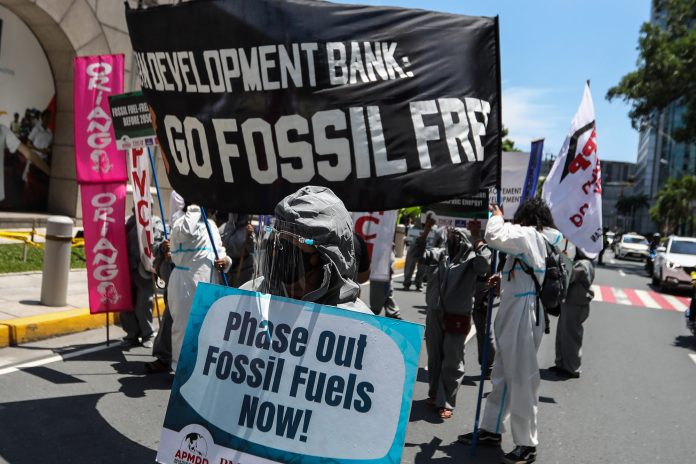Communities residing near coal power plants in the provinces of Pangasinan, Quezon, Davao, and Cebu demanded that the government raise the country’s air quality standards, and end the use of coal and other fossil fuel.
The communities, which pro-environment group Greenpeace said have been exposed to unhealthy levels of air pollution in their own homes, expressed the demands through solidarity protests during the “National Day of Action Against Air Pollution” last week.
“Ever since the coal plants were built in our areas, we have been experiencing a foul smell and non-stop dust in the air we breathe,” said Domingo Moreno, convenor of Tagapagtanggol ng Kalikasan sa Pagbilao group.
“This often causes coughing and colds among our family members and neighbors,” he said, adding that coal plants “must be stopped, and communities must be protected from coal’s dirty emissions.”
Since 2020, through work with Greenpeace Philippines and the Philippine Movement for Climate Justice, the communities have been monitoring air quality levels using air quality monitoring devices that measure particulate matter (PM) 2.5 and 10.
A Greenpeace statement said community-based air quality monitoring helps people living in areas of concern record valuable data to support their campaigns against dirty industries and call the attention of policy makers.
“Not all areas have air pollution data, especially in communities near coal plants. This is why the people themselves are mobilizing to solve and generate awareness on our polluted air,” said Larry Pascua, PMCJ campaigner.
“Even if coal plant operators say they follow the law, coal plants are still destructive as our standards are way lower than that of the WHO,” added Pascua.
In 2021, the World Health Organization released updated guidelines for air pollutants based on growing evidence of health threats, but the government has yet to adopt the standards in the Philippines.
The current national standard on annual levels of PM2.5 is at 25 ug/Ncm, while the WHO recommends 5 µg/m3.[1] Air pollution from fossil fuels — primarily coal, oil, and gas —is attributed to cause an estimated 27,000 premature deaths per year in the Philippines, and can cost the country up to approximately 1.9% of GDP in economic losses annually according to a 2020 Greenpeace report.
Greenpeace believes that aside from addressing the inadequate air pollution monitoring and regulations, the government needs to urgently transition away from energy sources like coal.
The latest data from the Department of Energy (DOE) shows that coal remains the largest in terms of installed generating capacity in the country – 10,944 Megawatts hour (MWh) out of the 26,286 MWh total.
Greepeace said the despite the DOE moratorium on greenfield coal power plants in 2020, coal power in the Philippines rose by 8% in 2021.
“Even during the COVID pandemic, coal power plants continued to operate and fossil fuel projects continued to be constructed,” said Greenpeace campaigner Khevin Yu.
“The best way to address the air pollution from the energy sector is to transition to renewable energy sources, which do not emit air pollution during operation, can provide reliable energy for all, and is the best solution to the climate crisis,” said Yu.
Following the release of the third part of the Intergovernmental Panel on Climate Change’s “Sixth Assessment Report” last week, Greenpeace has called on incumbent and incoming government leaders to stop procrastinating on climate action at the cost of the people’s health, economy, and future.
“Delaying the transition to renewable energy is causing thousands of premature deaths from air pollution, and costing the Philippines trillions of pesos annually,” said Yu.
“To protect the Filipino people, the government must be firm in initiating the phase out coal-fired power plants, and our next leaders must prioritize climate action with a goal to initiate the transition to 100% RE,” he added.









